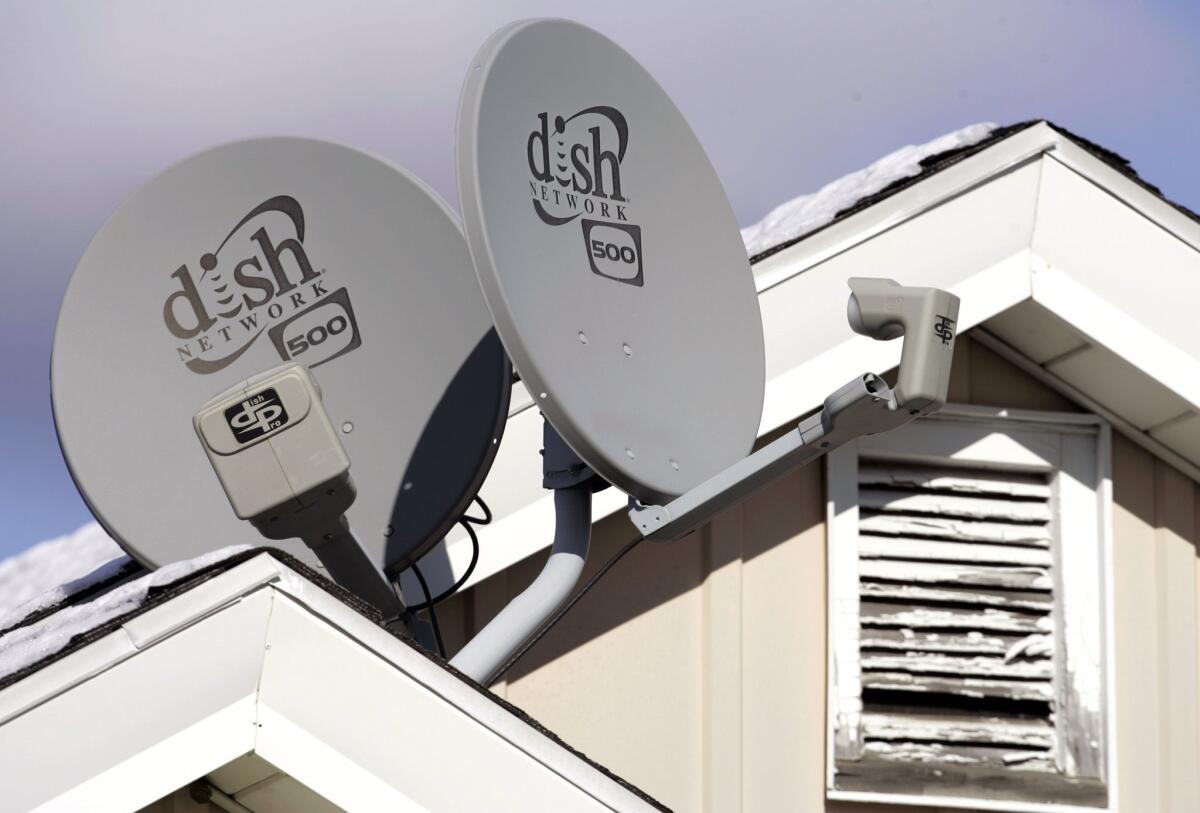Opinion: Lawsuit over TV recordings yields a limited win for viewers’ rights

The Supreme Court’s ruling last June against Aereo, the online TV viewing service, threatened to undermine consumers’ ability to record television shows in the cloud and watch them remotely. But in a key ruling this month, a federal judge in Los Angeles affirmed that consumers had the right to time- and space-shift TV shows even when they used technology more advanced than a VCR.
One major caveat, though, is that District Judge Dolly M. Gee distinguished between recordings made by consumers in their homes and those made by service providers remotely. Gee gave her blessing to the former but not necessarily to the latter. Another is that while copyright law may not block space-shifting, contracts can.
At issue were four features that Dish Network introduced in 2012 and 2013: “Dish Anywhere,” which allows people to stream shows from a Dish receiver in their home (called a “Hopper”) to a laptop or other device connected to the Internet; “PrimeTime Anytime,” which can automatically record all the primetime shows aired by the four major networks and save them for two weeks; “AutoHop,” which plays back recorded shows without the commercials; and “Hopper Transfers,” which lets subscribers transfer a show recorded on the Hopper to a portable device.
The major networks sued Dish, but several settled their claims in the course of negotiating new licensing agreements. Fox Broadcasting had not, leading Gee to decide the legal issues in the case on Jan. 12. In that ruling, which was released Tuesday, Gee sided with Dish on almost all of Fox’s copyright claims, while backing Fox on its claims for breach of contract.
The Supreme Court’s landmark Sony Betamax ruling from 1984 established that consumers can legally record TV shows at home for later viewing, and manufacturers can sell them devices to make those recordings even if the devices could also be used to violate copyrights (for example, by making copies of shows for sale). More recently, the 2nd Circuit Court of Appeals held that consumers weren’t limited to recording TV shows on devices in their homes; they could also do so on equipment owned and operated by a service provider, such as their local cable TV operator.
The 2nd Circuit’s ruling opened the door to cloud-based digital video recording services, but the Supreme Court’s Aereo ruling threatened to close it. That’s because the majority opinion, written by Justice Stephen G. Breyer, held Aereo responsible for what users did with its service. Breyer rejected Aereo’s argument that its subscribers were transmitting programs privately to themselves over the Internet, ruling instead that Aereo was transmitting them to the public in violation of the programs’ copyrights.
Echoing Justice Antonin Scalia’s dissent in the Aereo case, Gee said a key factor in whether Dish had infringed copyrights was determining whether Dish or its customers made and streamed the recordings. Although Dish Anywhere relies to some extent on equipment and services provided by Dish, she wrote, “it is the user who initiates the process, selects the content, and receives” the streamed program. “No DISH employee actively responds to the user’s specific request or directly intervenes in the process of sending the programming between the devices,” she added.
Similarly, with regard to PrimeTime Anytime, Gee wrote, “While Dish has set certain parameters and controls for [PrimeTime Anytime, it] is essentially a more targeted version of a DVR that is set to make block recordings or recordings of an entire season of a show. The ability to set a DVR and then leave it to automatically record without having to select individual programs or set it repeatedly for each recording occasion is not unique to [PrimeTime Anytime], and is not enough to show direct infringement by the service provider.”
The same reasoning applied to Hopper Transfers, Gee wrote. “Dish subscribers, not Dish, make and transfer the Hopper Transfers copies using Dish’s equipment. Hopper Transfers is a technology that permits non-commercial time- and place-shifting of recordings already validly possessed by subscribers, which is paradigmatic fair use under existing law.”
The judge emphasized, however, that the recording at issue was being done in subscribers’ homes, which is different from the situation in Aereo -- and, potentially, any cloud- or network-based service.
“Aereo streamed a subscriber-specific copy of its programing from Aereo’s hard drive to the subscriber’s screen via individual satellite when the subscriber requested it, whereas Dish Anywhere can only be used by a subscriber to gain access to her own home [Hopper] and the authorized recorded content on that box,” she wrote at one point.
She added later that PrimeTime Anytime “is a system for automatically recording programming as it is being received by a subscriber’s [Hopper], inside the subscriber’s home. Those recordings are not distributed, delivered, or transmitted to any other location or person using [PrimeTime Anytime] alone.”
One other clear win for consumers was on AutoHop, which the Ninth Circuit had previously held to be non-infringing. At the time, Fox didn’t claim any copyrights in the commercials being skipped, but when the case returned to Gee, Fox noted that it did have copyrights over a sizable percentage of the skipped commercials -- the ones that promoted other Fox shows.
Gee was not moved. “AutoHop neither copies nor distributes anything,” she wrote. “It skips ads. Absent unauthorized copying or distribution, it is immaterial for purposes of the copyright infringement claim that the ads being skipped are Fox’s own commercials.”
One copyright claim that Gee decided in Fox’s favor was its argument that Dish improperly copied its programs in order to test the quality of its AutoHop service. Gee also held that Dish Anywhere, the AutoHop test copies and Hopper Transfers all violated a provision of Dish’s contract with Fox that prohibited Dish to make or authorize programs to be copied outside a subscriber’s home.
The ruling leaves open the possibility that content providers will insist on similar no-copying clauses to block the sort of free streaming that the Hopper enables. It also offers little comfort to service providers worried about the implications of the Aereo ruling for network- and cloud-based recording systems.
Nevertheless, Gee breathed new life into the principle of “volitional conduct,” that is, the notion that a device manufacturer or service provider isn’t liable for copies made and controlled by their customers. For companies eager to turn audio-video devices in the home into services in the cloud, that principle could spell the difference between having a business and being Aereo.
Follow Healey’s intermittent Twitter feed: @jcahealey
More to Read
A cure for the common opinion
Get thought-provoking perspectives with our weekly newsletter.
You may occasionally receive promotional content from the Los Angeles Times.







